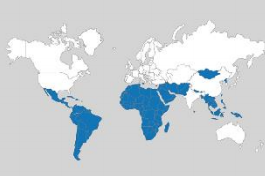Africa, Central and South America, South and Southeast Asia, most of the Middle East, and the island nations of the Pacific, Indian Ocean, and the Caribbean

When I played my role in the policy exercise, I felt…
tense, uncomfortable, and even helpless. All the countries were asking for us to do more, like decrease our emissions per person), even though the developing countries have the second-lowest carbon emissions per person (2.5%).
How did your reaction, comments, feelings; and shifts (if any) in negotiating positions evolve across the rounds and discussions?
In the beginning, I did not feel as threatened. However, during the second round, all the other nations seemed to be frustrated with us because we had little to contribute towards lowering global warming below 2°C. Even though the other developing countries did not cause the problem, we seemed to be attacked, especially by the United States.
How did your group change their ideas?
After the second round, and with much pressure from the other nations, we decided to annual reduction rate from 0% to about 1.5%, but even that was not enough to lower the rate to 2%.
What prompted that change?
All the other nations pressuring us prompted that change.
In the end, do you think that emissions can be cut?
I think it will be possible if all the nations made it a priority and if all the nations would join together instead of arguing with each other about the cost. However, I do not know if this will actually happen because each nation has its own concerns.
What were the major costs and barriers to implementation of participant proposals?
As the other developing countries, we needed money and therefore, could not contribute to the costs for the global fund. We could not significantly cut emissions because the nations are still developing and progressing. Furthermore, the carbon emissions per person were already so low, it was hard to lower it even more. Being composed of many different countries made it hard for us because we had to worry about so many people and how these implementations would affect them.
How can we catalyze change in the US?
I think the best way we can catalyze change in the US is to educate the public about the danger of not doing anything towards global warming. Furthermore, the issue of global warming needs to be a bigger priority than it is currently.
